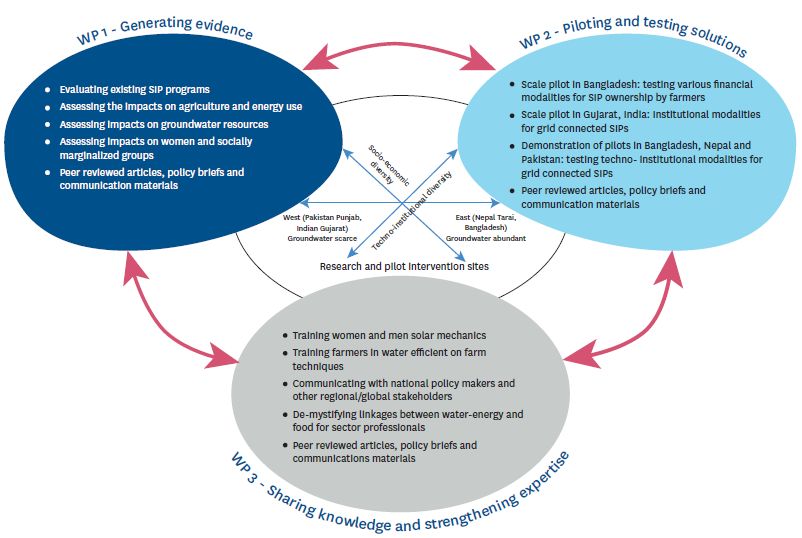The project has three main objectives (outcomes). Below figure provides a pictorial diagram of the three work packages that have been designed to inform each of these outcomes. All activities in this project has been co-designed with implementing partners and is based on analysis of gaps and needs. The information below describes each of the work packages and outputs and activities.
i. Work Package 1
ii. Work Package 2
iii. Work Package 3

Work Package Graphic Diagram
Impact evaluations, GESI and groundwater case studies
This WP 1 will conduct rigorous impact evaluations on some selected SIP programs of our government partners. Government partners associated with this project have requested IWMI to evaluate their SIP programs and provide them with recommendations on how the implementation and outcomes of these programs can be improved. We will conduct this impact evaluation using quasi-experimental methods. The main outcome variables of interest are:
- agricultural and nutritional outcomes, with a special focus on women and children;
- on energy savings, consumption, and GHG emissions; and
- on groundwater withdrawals.
We will use the existing monitoring data provided by our partner agencies, and supplement those with primary field data collected through measurements and survey instruments. This activity will be undertaken in Bangladesh and Nepal. In India, we will conduct a qualitative assessment of SKY feeders in Gujarat as part of scale pilot (see activity 2.2.2) and assess existing SIPs in Pakistan as part of groundwater-related studies (see activity 1.2.3) and demonstration pilot (see activity 2.2.4).
1.1 Expected output: Impact of Solar irrigation on livelihoods of women and men farmers
Activity 1.1.1: Impact evaluation and GESI case study of IDCOL’s SIP programs
Activity 1.1.2: Impact evaluation and GESI case studies of SIP programs in Nepal
1.2 Expected output: Impact of large-scale SIP adoption on groundwater sustainability documented
Activity 1.2.1: Groundwater related studies embedded in demonstration pilot site in Bangladesh
Activity 1.2.2: Groundwater related studies embedded in scale pilot site in Gujarat, India
Activity 1.2.3: Groundwater related studies embedded in demonstration pilot in Pakistan
Scale and demonstration pilots
Activities in this work package will contribute to outcome 2 of improved livelihoods of women and men farmers through access to solar irrigation as a result of GESI-responsive and groundwater-aware solar irrigation policies. We will implement two types of pilots to derive our outputs and outcomes. Scale pilots are those that are implemented with government partners as a part of their ongoing project/program activity. The aim of these scale pilots would be to improve the efficiency, equity, and sustainability of ongoing government SIP programs. Demonstration pilots, in contrast, will try to exhibit how a certain technical or institutional innovation (e.g., grid-connected SIPs) can be used to answer relevant policy questions. Demonstration pilots will be smaller in scale and will cover one or two villages, or a few transformers, at most.
2.1 Expected output: Demonstrate and document GESI-Responsive, Pro–Poor and Groundwater aware solar irrigation financial promotion models
Activity 2.1.1: Scale pilot in Bangladesh
2.2 Expected output: Technical and institutional modalities for grid connection of SIPs in different water-energy regimes
Activity 2.2.1: Demonstration pilot on grid-connected pumps in Bangladesh
Activity 2.2.2: Scale pilot on institutional aspects of grid connected SIPs in Gujarat, India
Activity 2.2.3: Demonstration pilots on grid connected SIPs in Nepal
Activity 2.2.3: Demonstration pilots on simulation of grid -connected pumps in Pakistan
2.3 Expected output: Technical, financial and institutional innovations demonstrated
Activity 2.1 Administration of innovation funds
Capacity building and knowledge sharing
This work package will contribute to Outcome 3: to increase regional knowledge and capacity building for GESI-responsive and groundwater-aware solar irrigation policies and practices. This work package has three outputs, described in sub-sections below.
3.1 Expected output: Trainings, Capacity Building and Exposure visits
Activity 3.1.1 Training of local technicians and farmers (women and men)
Activity 3.1.2 Regional training of groundwater, energy and agriculture officials
3.2 Expected output: Multi- Stakeholder forums for global and regional knowledge exchange
Activity 3.2.1 Regional knowledge and policy forums
Activity 3.2.2 National policy forums
3.3 Expected output: Technical, Financial and Institutional innovational innovations demonstrated
Summary of outcomes, outputs and activities
Table 3 summarizes all the outcomes and outputs and the country of implementation of each of these activities.
Table 3: Mapping of all outcomes and outputs
| Short description | BD | IN | NP | PK | ||
| Outcome 1: Improved empirical evidence to support development of climate-resilient, gender-equitable, socially-inclusive, and groundwater-aware solar irrigation policies. (WP1) | ||||||
| Output 1.1 | Impact of solar irrigation on livelihoods of women and men farmers and climate resilience documented and shared with policymakers | |||||
| Output 1.2 | Impact of large-scale SIP adoption on groundwater sustainability documented and shared with policymakers | |||||
| Outcome 2: Innovative approaches for gender-equitable, socially-inclusive, and groundwater-aware solar irrigation are validated. (WP2) | ||||||
| Output 2.1 | GESI-responsive, pro-poor and groundwater-aware financial models for solar irrigation promotion demonstrated and documented | |||||
| Output 2.2 | Technical and institutional modalities of grid connection of SIPs in different water-energy regimes demonstrated | |||||
| Output 2.3 | Technical, financial, and institutional innovations demonstrated | |||||
| Outcome 3: Increased national /global knowledge and capacity for gender and socially inclusive and groundwater responsive solar irrigation policies and practices. (WP3) | ||||||
| Output 3.1 | A cadre of women and men farmers and technicians trained and water-energy-agriculture experts in the region sensitized on cross-sectoral linkages | |||||
| Output 3.2 | Multi-stakeholder forums for global, regional and national exchange of knowledge on best practices in GESI-responsive and groundwater-aware solar irrigation policies and practices | |||||
BD=Bangladesh; IN=India; NP=Nepal; PK=Pakistan; WP=Work Package
